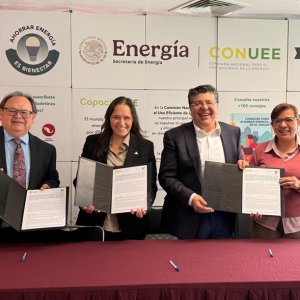Innovate to Maximize Benefits

STORY INLINE POST
In 2016, energy council COMENER and IPADE Business School organized a meeting for the energy sector under the name 2021 Vision: Mexico’s Energy Sector Structure. During the event, IPADE and Strategy&, a PwC division, unveiled a study they had conducted, and the results were astonishing, says Juan Acra, President of COMENER. “In the electricity sector, there is a need to double the current capacity owned by CFE by 2031, which is around 57GW. This means that during the next 15 years, we have to install the infrastructure that took CFE over 80 years to build.”
To this end, the electricity auctions, will be an integral part of the equation. There is work yet to be done to keep private money flowing in, and Acra believes that a legal framework that offers certainty in energy projects — particularly in terms of social licenses — and makes energy purchasing contracts bankable is crucial. “A legal framework ensuring social licenses are present before a project is offered in an auction or in a contract would guarantee that the project proceeds, mitigating risks as a result.”
COMENER has a team that focuses on social licenses and Acra says that, after a deep analysis of the law, the team has found that amparos have become a dangerous legal tool, both for the oil and gas and the electricity sectors, capable of preventing investment flows into the country. “This is because an amparo can be granted by a federal judge who may or may not be knowledgeable about the project, what it represents in terms of securing electricity supply and the associated positive social impacts,” Acra explains. The council is now working together with the Mexican Lawyers’ Bar Association to make sure that the government knows and understands the problem, and to find ways to solve it. COMENER’s commitment to the development of the industry is backed up by a total US$25 million assurance from its members.
Acra also believes that older companies and their production plants have a role to play in the country’s energy future and should not be forced to die out. “Mexico’s energy transition should instead allow companies to switch from one business model to a newer one,” he says, while acknowledging that this cannot be done overnight. Nevertheless, he says that such a change would result in huge benefits. “It would be a big mistake to let older companies die just because they are old, as that would mean destroying an important infrastructure that is already in place and works, even if it is inefficient. The legal framework must also allow and facilitate this transition.”
Efficiency is another important point to be considered when talking about costs and environmental impact. In 2014, the International Energy Agency reported that around 8 percent of electric energy worldwide is lost just in transmission and distribution lines, without considering efficiency losses in final consumption. Acra is aware of the problem, but emphasizes Mexico’s capabilities to increase its efficiency across the whole value chain.
Energy efficiency in transmission and distribution is not vital for power producers as it actually decreases the amount of energy they sell, while energy consumers want to implement energy efficiency to reduce their costs. Acra says energy-trading entities could play a critical role as mediators between energy generators and energy consumers. “As mediators, it is in their best interest to sell cheap energy produced through renewables, so their clients can reach their renewable implementation goals, but it is also important that clients maintain low consumption, so these entities can offer energy to more customers, which is why offering energy-efficiency analysis services to their clients is a big incentive,” he says.
Innovation is another important element in developing the country’s infrastructure, be it in the generation, transmission, distribution or efficiency areas, Acra adds. COMENER signed an agreement on Nov. 16, 2017, with the Houston Technology Center (HTC) to support projects in sustainability and hydrocarbons. “With this partnership, we expect to attract investments from institutions such as the Mexican Petroleum Fund and the Energy Sustainability Fund, as well as from initiatives such as that promoted by Bill Gates, called Mission Innovation, to promote Mexican technologies and innovation,” he says.























